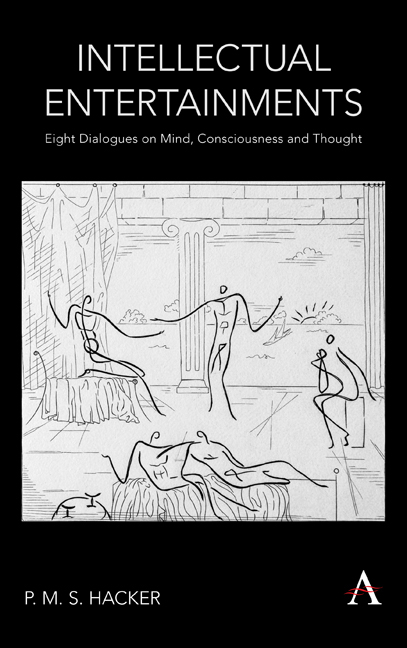Book contents
- Frontmatter
- Dedication
- Contents
- Preface
- Acknowledgements
- Section 1 Two Dialogues on Mind and Body
- Section 2 Two Dialogues on Consciousness
- Section 3 A Dialogue on the Objectivity or Subjectivity of Perceptual Qualities
- Introduction
- Fifth Dialogue On the Objectivity or Subjectivity of Perceptual
- Section 4 Two Dialogues on Thought
- Section 5 A Dialogue on Ownership of Pain
Fifth Dialogue - On the Objectivity or Subjectivity of Perceptual
from Section 3 - A Dialogue on the Objectivity or Subjectivity of Perceptual Qualities
Published online by Cambridge University Press: 06 December 2019
- Frontmatter
- Dedication
- Contents
- Preface
- Acknowledgements
- Section 1 Two Dialogues on Mind and Body
- Section 2 Two Dialogues on Consciousness
- Section 3 A Dialogue on the Objectivity or Subjectivity of Perceptual Qualities
- Introduction
- Fifth Dialogue On the Objectivity or Subjectivity of Perceptual
- Section 4 Two Dialogues on Thought
- Section 5 A Dialogue on Ownership of Pain
Summary
‘The picture is something like this: Though the ether is filled with vibrations, the world is dark. But one day man opens his seeing eye, and there is light’ (Wittgenstein)
Protagonists:
Thomas Roe: a bright twenty-year-old Oxford undergraduate; dressed as a (respectable) modern-day student.
Professor Ronnie Freiberg: an American scientist presenting a Galtonian picture of views advanced by physicists, psychologists and neuroscientists; in his early forties; dressed in an open-necked shirt, jeans and comfortable loafers; very laid back, friendly and informal.
Dr James Lockett: an elderly gentleman, somewhat shy and diffident; pupil of Locke; meticulous and pedantic pronunciation; wearing an early eighteenth-century dress of a scholar, bewigged.
Professor Timothy Swan: Tom's tutor, a middle-aged Oxford don, presenting a synopsis of views current among Oxford philosophers over the last four decades; dressed in a tweed jacket and tie, casual light brown slacks; neutral educated English accent; slightly pompous and condescending.
Socrates: gruff gravelly voice, slight regional accent; wearing Greek dress.
The scene is a garden in Elysium. The sun is shining. A rich verdant lawn is surrounded by flower beds and rose bushes in bloom, with tall trees behind. Beyond, there is a beautiful view of lake and mountains. Five comfortable garden chairs are placed in the shade beneath some trees. There is a low table on which there is a wine decanter and glasses of wine, and some scattered books.
Dr Lockett, Professor Swan and Professor Freiberg are arguing with Tom. One chair is vacant.
Tom: But you can't really mean that! You can't really mean that all this [he gestures at the garden all around] is just a kind of, kind of, illusion – that nothing here is coloured!
Professor Freiberg: Yeah, that's exactly what we mean. Color's just a sensation in the brain. Science has proved this, Tom. What colors things seem to have is a function of the spectrum of light they reflect. Things absorb or reflect electromagnetic radiation that impacts their surface. If the radiation is in the 390 to 700 nanometer wavelength, it's what we call ‘visible light’. If a surface absorbs all the light that impacts it, it appears black. If a surface reflects and scatters it all, it looks white. All the chromatic colors are produced by partially reflected light of one or another band of wavelengths.
- Type
- Chapter
- Information
- Intellectual EntertainmentsEight Dialogues on Mind, Consciousness and Thought, pp. 113 - 142Publisher: Anthem PressPrint publication year: 2019



